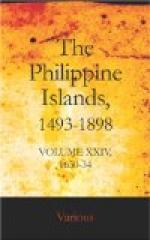Father Fray Jeronimo de Cabero presided at that chapter, as we had no letters-patent from our father general. As definitors, father Fray Juan Enriquez, father Fray Pedro de Lesarte, [39] father Fray Alonso de Baraona, and father Fray Felipe de Tallada were elected. The visitors were father Fray Estacio Ortiz and father Fray Agustin de Mejia. All together assembled, they annulled preceding orders and enacted others for the good management of the province.
But little life was left for our father provincial, for a very slight accident occasioned his death, so that, without any medicine sufficing, he went away and left us on the seventeenth of May, leaving us disconsolate and very desirous of him.
Our rules, in such an event, summon the preceding provincial, who immediately took the seal. Persons were not lacking to advise him to leave the government of the province, saying that the province was not well affected toward him. And even persons outside of the order who were viewing things with some interest, said the same to him. But we are not to understand that any ambition guided him, but that since he had had experience in the government, which is not the least thing, he thought that he could govern better than another. He commenced to burden the province with mandates, for in his term there was too much of that. Thereupon, the fathers began to regard him less favorably than before, and to represent to themselves the evil of his having the command. There were meetings and discussions in which the coming evil was clearly presaged and announced. One old religious, who was such in all things, in order to avoid cavilings and inquisitions went to confess to him; and told him that he knew most positively that they wished to kill him, and that he should relinquish his office. He assented to nothing, carried away, doubtless, by his good zeal. A brother served him in his cell, a creole whom he wished well and whom he treated with affection. The latter, in return for the benefits which he received, gave him pounded glass in his chocolate, for he had been told that that was the most virulent poison which could be administered. But the provincial’s natural force resisted everything, for he was robust, though small of body.




